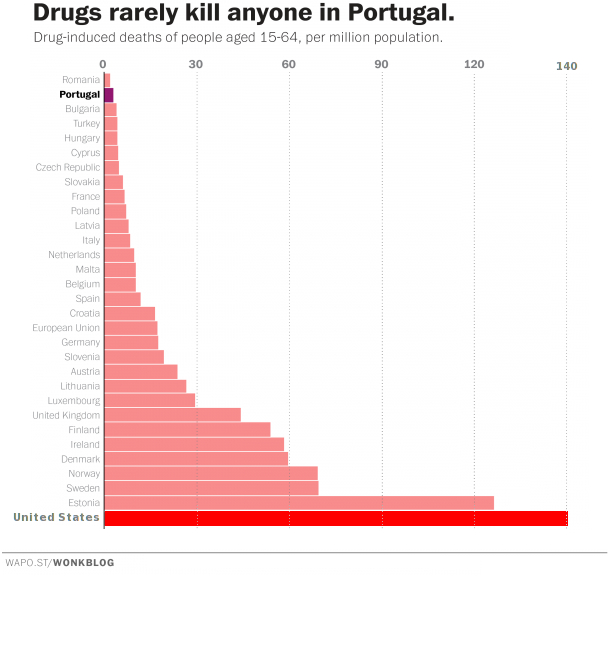Hardly anyone dies from drug overdoses in decriminalised Portugal
Hardly anyone dies from drug overdoses in decriminalised Portugal
FOURTEEN years ago Portugal was home to more than 100,000 drug addicts and lost around 400 of those to overdoses annually.
Its prison system was bloated with drug offenders doing time for possessing and distributing heroin, cocaine and other illegal substances, and its hospitals were bursting with an average of 1400 HIV sufferers, their infections caused by dirty needles.
Since 2001, those numbers have all dropped dramatically thanks to one small change.
In fact, since that year, you won’t have found a single offender behind bars for drug use in Portugal.
It’s not because the drug users all learnt their lessons and had a sudden change of heart, but because the use and possession of drugs is no longer criminal.
While it’s still illegal to carry or use marijuana, cocaine, heroin and other similar substances,
none of those offences will earn you jail time or a criminal record but rather a small fine or rehab since the government introduced decriminalisation in 2001 with astonishing results.
New data from the European Monitoring Centre for Drugs and Drug Addiction shows that for every 1,000,000 citizen deaths in Portugal, only three were caused by drug overdose.
In the UK, that number is 44.6 per million and in Netherlands 10.2 per million while the EU average is 17.3 overdose deaths per million adults.
Though critics of decriminalisation warn the move would create more users, the prevalence of drug use among adults in Portugal has also continuously fallen since 2001, and overall adult drug use and new HIV cases are also way down.
The EMCDDA report also notes legal highs — the use of new synthetic psychoactive substances like synthetic marijuana and “bath salts” — has plummeted, with use of those substances among young adults (aged 15-24) at only 0.2 per cent.
As The Tribune notes, Portugal’s low drug death rate cannot solely be attributed to decriminalisation.
Dr Joao Goulao, the national drug co-ordinator for Portugal and the architect of the country’s progressive drug policy himself said: “it’s very difficult to identify a casual link between decriminalisation by itself and the positive tendencies we have seen”.
But it’s clear the move hasn’t had the disastrous results predicted by critics.
The Transform Drug Policy Institute concedes in its analysis of Portugal’s laws, according to the Independent, the policy has had a positive effect.
“The reality is that Portugal’s drug situation has improved significantly in key areas,” it says.
“Most notably, HIV infections and drug-related deaths have decreased, while the dramatic rise in use feared by some has failed to materialise.”
These statistics collected over the past 15 years are of particular interest in the US and even Australia, where issues like marijuana legalisation and decriminalisation are hot.
In Australia, where the use of cannabis for medical or personal recreational use is decriminalised in some areas and heavily campaigned for, the discussion of decriminalising and even legalising illicit drugs is routinely raised.
The current ice epidemic has led Melbourne police to consider a solution close to what’s implemented in Portugal, where ice users will be able to check into rehab to avoid criminal charges.
Cont -
http://www.news.com.au/lifestyle/he...nalised-portugal/story-fneuzlbd-1227387847823








